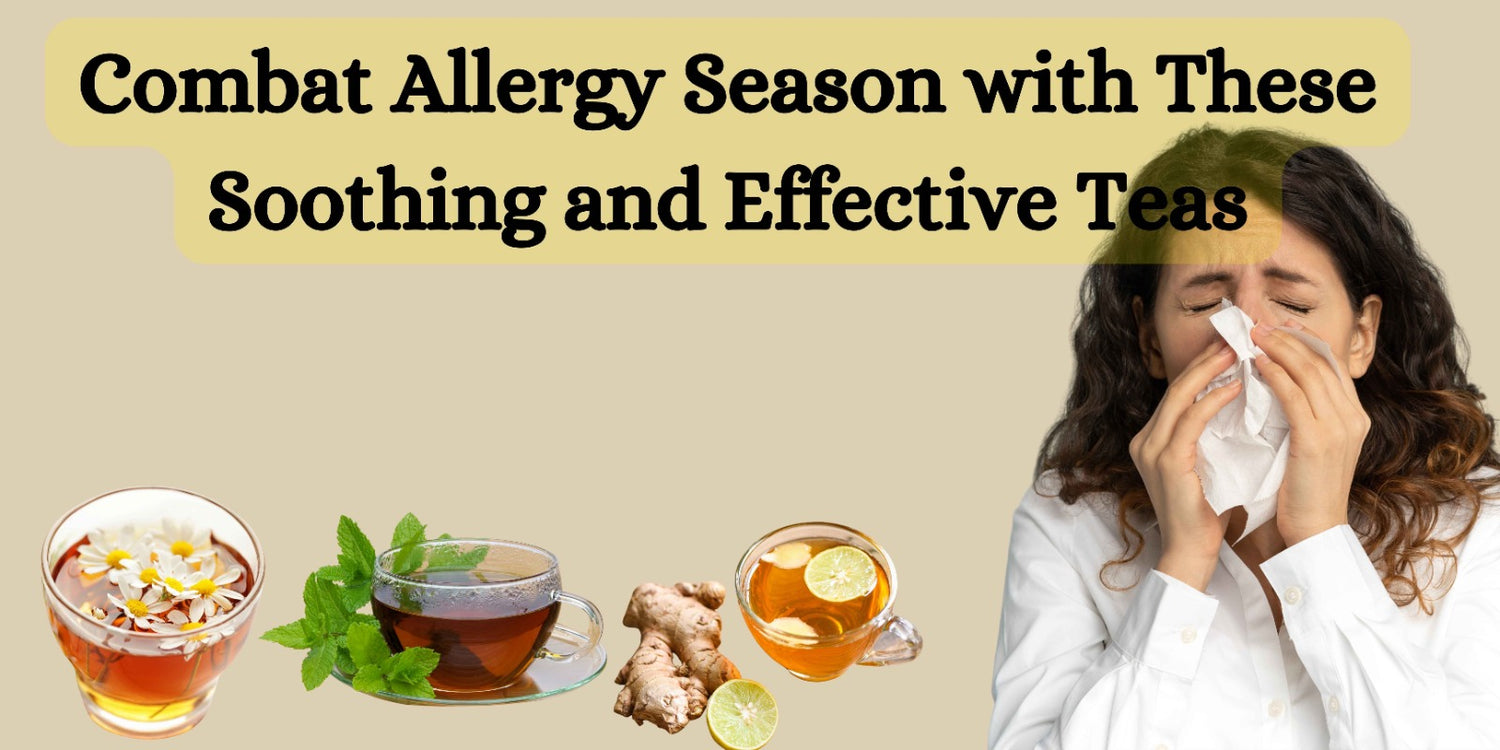Allergy season can be a challenging time for many of us, bringing with it a host of uncomfortable symptoms that can disrupt our daily lives. From sneezing and congestion to itchy eyes and throat, the impact of these seasonal allergies, also known as hay fever or allergic rhinitis, can be quite debilitating. However, amidst the myriad of pharmaceutical solutions, there exists a natural and comforting remedy that has stood the test of time - tea. In this comprehensive guide, we will explore how certain types of teas can provide relief during allergy season, delving into the soothing and effective properties of these beverages, and how incorporating them into your routine can make a significant difference.
Understanding allergies and allergy season
Allergies are the immune system's response to foreign substances, known as allergens, which are typically harmless to most people. These allergens, which can range from pollen to pet dander, trigger a reaction in the body that leads to the symptoms commonly associated with allergies. The specific time of year when these symptoms flare up is often referred to as allergy season, which can vary depending on the type of allergen and the geographical location. During this period, many individuals find themselves seeking remedies to alleviate their discomfort.
The key to managing these symptoms lies in understanding the underlying causes of allergies. When our bodies encounter an allergen, they produce antibodies called Immunoglobulin E (IgE), which in turn trigger the release of histamine. Histamine is responsible for most of the symptoms associated with allergies, such as swelling, redness, and itching. Consequently, treatments often focus on either avoiding triggers or mitigating the effects of histamine.
The benefits of tea for allergy relief
Tea, a beverage cherished around the world for its comforting warmth and myriad health benefits, also possesses properties that can aid in the relief of allergy symptoms. The natural compounds found in various types of tea, such as antioxidants, flavonoids, and other phytochemicals, can play a pivotal role in strengthening the immune system and counteracting the inflammatory response triggered by allergens.
Additionally, certain teas have been found to possess natural antihistamine properties, which can help in reducing the production of histamine and alleviate the symptoms of allergies. Moreover, the hydration provided by drinking tea can be beneficial in thinning mucus, thereby easing congestion and promoting better breathing. The warmth of the tea can also soothe sore throats, a common symptom during allergy season.
Types of teas that help soothe allergies
Several types of teas have been identified as particularly beneficial for those suffering from allergies. Each type contains specific compounds and properties that can target different aspects of allergy symptoms. In the following sections, we will explore some of the most effective teas for allergy relief, detailing how they can be incorporated into your daily routine to help you navigate allergy season with greater ease.
Green tea for allergy relief
Green tea, renowned for its antioxidant properties, is a powerful ally in the fight against allergies. The key component in green tea is a compound known as epigallocatechin gallate (EGCG), which has been shown to inhibit the production of histamine and IgE, thereby mitigating the body's allergic response. Furthermore, green tea is rich in polyphenols, which can help in reducing inflammation, a common symptom of allergic reactions.
Incorporating green tea into your daily routine during allergy season can provide a soothing and natural way to manage symptoms. Drinking two to three cups of green tea throughout the day can help to maximize its benefits. For those who are sensitive to caffeine, decaffeinated versions of green tea are also available, ensuring that everyone can enjoy the anti-allergic benefits of this remarkable tea.
Chamomile tea for allergy relief
Chamomile tea, with its gentle floral flavor, is another excellent choice for those seeking natural allergy relief. Chamomile is known for its anti-inflammatory, antispasmodic, and antihistamine properties, making it effective in reducing symptoms such as sneezing, congestion, and itchy eyes. Additionally, chamomile tea can promote relaxation and improve sleep quality, which can be beneficial for individuals whose allergies disrupt their sleep patterns.
To reap the benefits of chamomile tea, it is recommended to drink one to two cups in the evening, as its calming effects can help prepare the body for a restful night's sleep. However, it is important to note that chamomile belongs to the ragweed family, and individuals with ragweed allergies should avoid this tea or proceed with caution.
Peppermint tea for allergy relief
Peppermint tea offers a refreshing and invigorating option for allergy sufferers. The primary active component in peppermint, menthol, is effective in clearing sinus congestion, one of the more persistent symptoms of allergies. The cooling sensation provided by menthol can also soothe sore throats and reduce coughing. Furthermore, peppermint has anti-inflammatory properties that can help in reducing the severity of allergic reactions.
Drinking a cup of peppermint tea can provide immediate relief from nasal congestion, making it a great choice for those times when allergies are particularly bothersome. For an enhanced effect, inhaling the steam from the tea can help to further open the nasal passages, providing additional congestion relief.
Lemon and ginger tea for allergy relief
Lemon and ginger tea combines the immune-boosting properties of lemon with the anti-inflammatory and antioxidant benefits of ginger, making it a potent remedy for allergy symptoms. Lemon is rich in vitamin C, a known immune system booster, while ginger has been shown to suppress the production of pro-inflammatory compounds that can exacerbate allergy symptoms.
Preparing lemon and ginger tea is simple and can be done by steeping fresh ginger slices and lemon juice in hot water. Drinking this tea throughout the day can help in alleviating symptoms such as congestion and sore throat, while also providing a refreshing and energizing beverage.
Other natural remedies for allergy relief
In addition to the teas mentioned above, there are other natural remedies that can be effective in managing allergy symptoms. These include maintaining a healthy diet rich in fruits and vegetables, which can provide essential nutrients and antioxidants to support the immune system. Staying hydrated by drinking plenty of water can also help in thinning mucus and relieving congestion. Furthermore, using a humidifier in your home can add moisture to the air, easing respiratory symptoms.
Regular exercise is another important factor in managing allergies, as it can help in boosting the immune system and improving overall health. However, it is crucial to choose the right time and place for outdoor activities, as pollen levels can vary throughout the day and in different environments.
Conclusion: Incorporating tea into your allergy season routine
Allergy season can be a difficult time for many, but the natural remedies provided by certain types of teas offer a comforting and effective way to manage symptoms. By understanding the specific benefits of green tea, chamomile tea, peppermint tea, nettle tea, and lemon and ginger tea, individuals can tailor their tea consumption to address their particular allergy symptoms. Additionally, incorporating other natural remedies and lifestyle changes can further enhance the ability to navigate allergy season with ease.
Embracing the soothing and healing properties of tea can provide not only relief from the discomforts of allergies but also an opportunity to enjoy a variety of delicious and healthful beverages. So, as allergy season approaches, consider stocking up on these beneficial teas and making them a staple of your daily routine. With their natural antihistamine, anti-inflammatory, and immune-boosting properties, these teas can be a valuable ally in the battle against allergies, helping you to enjoy the changing seasons with greater comfort and well-being.




